Sentence: Definition, Structures, Types, Useful Examples
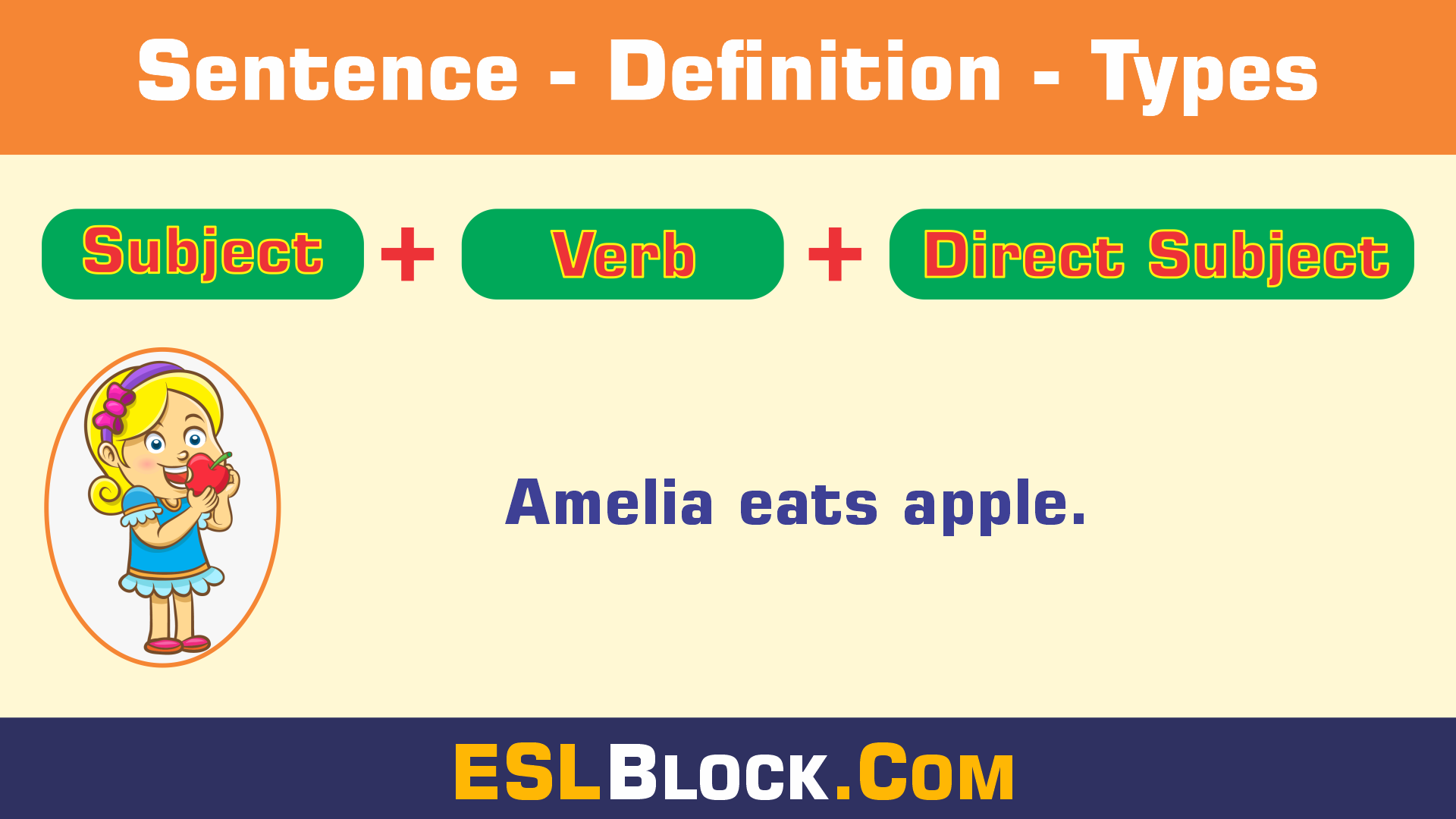
A sentence is the most important unit in any language. In English, it starts with capital letters and is ended with a full stop, a question mark and an exclamation mark.
A sentence is an individual phrase, clause, or a set of words or clauses that convey a whole concept. Sentences are essential in writing as they assist you to convey your ideas. Therefore, it is essential to create sentences that are precise and adhere to grammar rules.
Complete sentences generally include a verb. They can be used by themselves, be logical, and convey complete thoughts. This article will discuss the different types of sentences and structures that assist you in writing complete and correctly grammatically constructed sentences. Look closely.
What Is A Sentence?
A sentence is a set of words that is complete in itself, containing a subject and predicate, conveying a statement, question, exclamation, or command, and consisting of a main clause and sometimes one or more subordinate clauses.
Oxford Dictionary
Sentence Characteristics
A sentence must have a capital letter at start and full stop, question mark, exclamation mark at the end. Sentence must have full idea or thought. Lastly a sentence must have verb and subject.
For example: The happy cat.
This is a phrase and isn’t an example of sentence since it doesn’t have a verb. It does not state anything about the happy cat; hence the phrase does not give a complete idea or thought.
Sentence Examples
- Smith was a good king.
- Robert had a great army.
- She love my new pets.
- We drink coffee every evening.
- Does he play football?
- Did they construct a good house?
- Is Mia not playing with a doll?
- I have not completed my homework.
- Yes, Amelia will marry you!
- We watched TV last night.
Sentence Structures
Sentences are of four types with respect to structure.
- Simple Sentences
- Compound Sentences
- Complex Sentences
- Compound-Complex Sentences
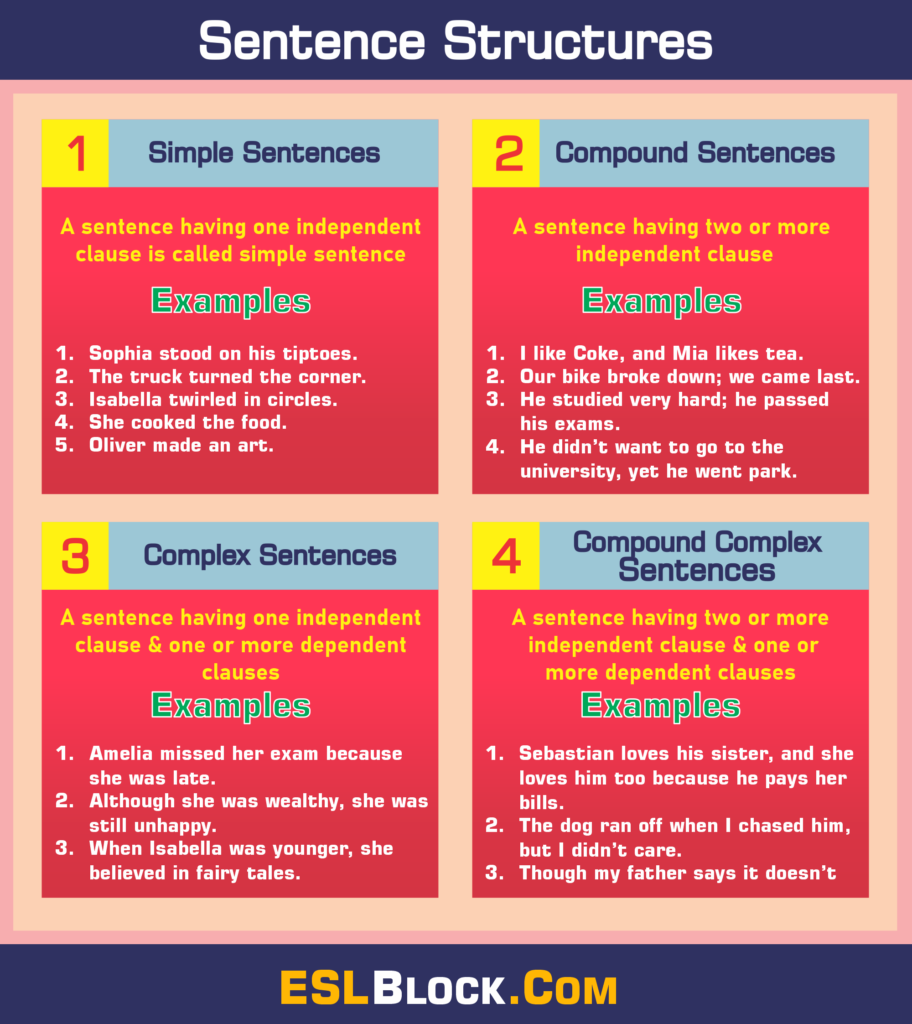
1. Simple Sentences
A sentence having single clause i.e. one verb is called simple sentence. Simple sentences usually have one thought or idea.
Simple Sentence Examples
- William waited for the bus. (one verb – single clause)
- Sophia stood on his tiptoes.
- The truck turned the corner.
- Isabella twirled in circles.
- She cooked the food.
- Oliver made an art.
- I cannot drink warm milk.
- I don’t like cats.
- She goes to school.
- He likes apples.
2. Compound Sentences
A compound sentence has a minimum of two independent clauses joined with a semicolon, comma, or conjunction.
An Independent clause has a subject and a verb that gives complete thought or idea.
A good example of a compound sentence would be, ‘This car is too expensive, and that car is too small.’ This is a compound sentence since it is composed of two separate clauses, ‘This car is too expensive and ‘that car is too small,’ separated by a comma, and the conjunction ‘and.’
Compound Sentence Examples
- I want the sporty black bike, but I will lease the practical red one.
- Amelia really needs to go to work, but she is too sick to drive car.
- He didn’t want to go to the university, yet he went park.
- Paris is my favorite city; I plan to spend three weeks there next month.
- William is happy to take your donation; any amount will be greatly appreciated.
- She only paints with bright colors; indeed, she does not like pastels at all.
- I like Coke, and Mia likes tea.
- Our bike broke down; we came last.
- Government does not solve problems; it subsidizes them. – Ronald Reagan
- He studied very hard; he passed his exams.
3. Complex Sentences
Complex sentences are interesting components that make up our English language. If they are used appropriately, they can enrich our writing.
Complex sentences comprise an independent clause and at least one dependent clause.
An independent clause can be used as a single sentence. It always has complete thought. The dependent clause is not standalone even if it contains both a subject and a verb.
Complex Sentence Examples
- Amelia missed her exam because she was late. (The independent clause is “Amelia missed her exam,” whereas the dependent clause is “because she was late” and the subordinating conjunction is “because”)
- Because my coffee was too hot, I cooled it in the refrigerator.
- Although she was wealthy, she was still unhappy.
- The returned the computer after they noticed it was damaged.
- Whenever prices goes down, customers buy more products.
- When Isabella was younger, she believed in fairy tales.
- Let’s go back to Paris because it’s where we had our first date.
- We really didn’t like the drama even though the acting was good.
- After the rain fell, the desert smelled good.
- Lily worked on the surprise gift while her father was out.
4. Compound-Complex Sentences
As the name suggests, a compound-complex sentence connects both sentence forms. These sentences are composed of multiple clauses. It is composed of at least two main clauses like the compound sentence and at least one dependent clause like a complex sentence.
Compound-Complex Sentence Examples
- Sebastian loves his sister, and she loves him too because he pays her bills.
- The dog ran off when I chased him, but I didn’t care.
- Though my father says it doesn’t matter, I am tall, and he is short.
- When Maria went to the shop, her parents wanted her to pick up some milk, but she didn’t have enough money.
- Even if the child is hungry, he will never eat mangoes, but he will always eat bananas.
- The woman was mean because she was lonely, but her attitude only made her situation worse.
- The cat needed more food, and she couldn’t go for a walk until she had.
- It is essential to vote when the time comes, or you won’t get a say in new laws.
- Orla doesn’t like songs because they are loud, so she doesn’t watch them.
- Harrison likes to sleep in but he can get up early if he has work.
Types of Sentences
- Declarative Sentences
- Interrogative Sentences
- Imperative Sentences
- Exclamatory Sentences
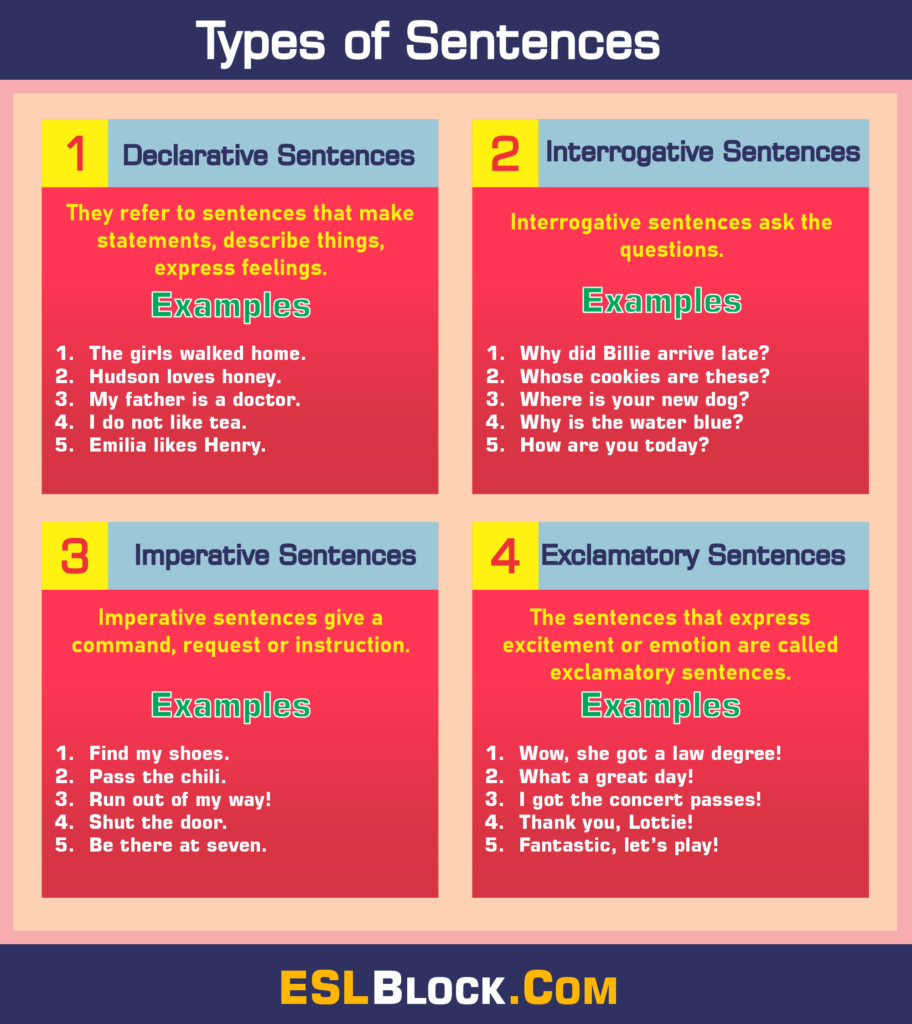
1. Declarative Sentences
The declarative sentence is the simplest kind of sentence. It is used to convey information and is punctuated with a period. Simple declarative sentences that make simple statements.
The declarative sentence is also known as an ordinary sentence, a declarative, or a statement of fact. Declarative sentences may be positive or negative and are among the most frequently used sentence types in English language sciences. They can be used to give the reader information or provide an explanation. Declarative sentences are based on a certain pattern for the structure of sentences.
Declarative Sentence Examples
Here are some declarative sentence examples:
- Maisie loves eating chocolates. (Statement)
- I am excited because of the upcoming holyday. (Feeling)
- His girlfriend is smartly dressed. (Describes a person)
- The girls walked home.
- Hudson loves honey.
- My father is a doctor.
- I do not like tea.
- They did not watch movie last night.
- I ordered a pair of shoes when I got to the Mall.
- Emilia likes Henry.
2. Interrogative Sentences
Interrogative sentences ask the questions. They are looking for details and always end with “question marks.” This kind of sentence usually starts with who, what, where, when, why, how, do, did, has, have, will, shall, is, am, are.
Interrogative Sentence Examples
Here are some Interrogative sentence examples:
- What is the right way to stitch a shirt?
- When are the best days to go to shopping?
- Where is your new dog?
- Why is the water blue?
- How are you today?
- Did you complete your assignment?
- Do you know the answers to the English Grammar assignment?
- Why did Billie arrive late?
- Whose cookies are these?
- How do they open this?
3. Imperative Sentences
Imperative sentences give a command, request or instruction. They end with a period (.) or exclamation mark (!).
Imperative Sentence Examples
Here are some Imperative sentence examples:
- Find my shoes.
- Pass the chili.
- Run out of my way!
- Shut the door.
- Be there at seven.
- Wash your hands.
- Complete by tomorrow.
- Consider the black jacket.
- Get out!
- Play ball!
4. Exclamatory Sentences
The sentences that express excitement or emotion are called exclamatory sentences. They end with exclamation mark (!).
Exclamatory Sentence Examples
Here are some Exclamatory sentence examples:
- Wow, she got a law degree!
- What a great day!
- I got the concert passes!
- Thank you, Lottie!
- Fantastic, let’s play!
- How well he dances!
- What a sad ending!
- How well she listens!
- I’m so happy right now!
- That’s such a nice ring!
Conclusion
We now know the various important aspects of sentences. Because defining the full meaning of a sentence in only two words is not easy and time-consuming, it is best to keep in mind all the characteristics of the complete sentence. Knowing these traits will allow us to identify whether an expression is correct grammatically or not.
If you’re having any doubts about the qualities of a full sentence, you can leave a comment below, and we’ll attempt to give you feedback.
If you really enjoyed article “Types of Sentences“, then I will be very thankful if you’d help it spread by emailing it to your friends, or sharing it on Twitter, Instagram, Pinterest or Facebook. Thank you!
Explore full list of words that start with A to Z!

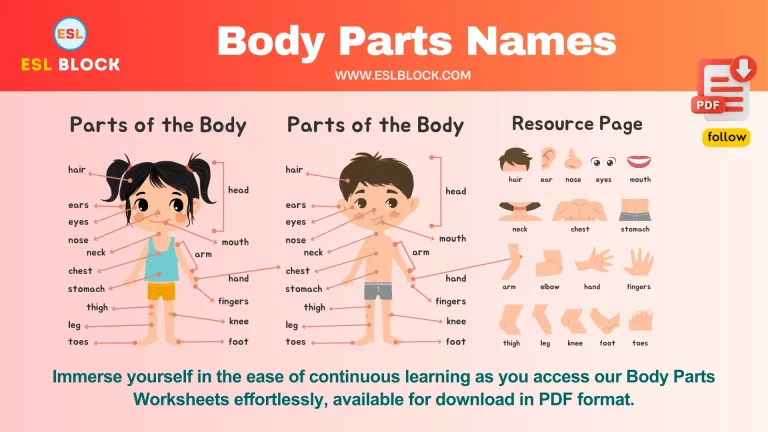
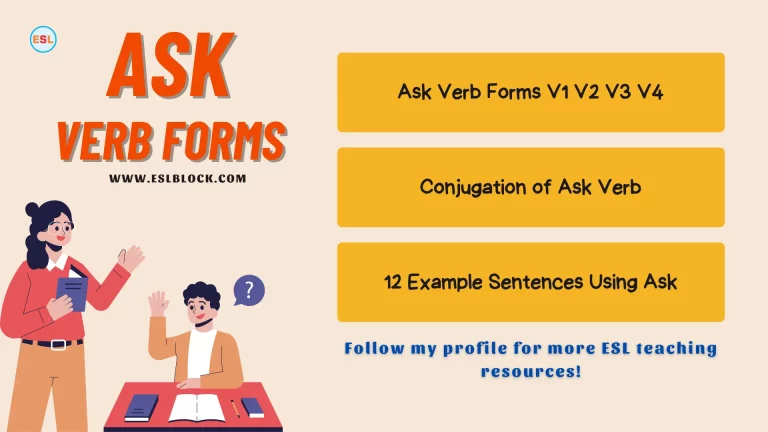
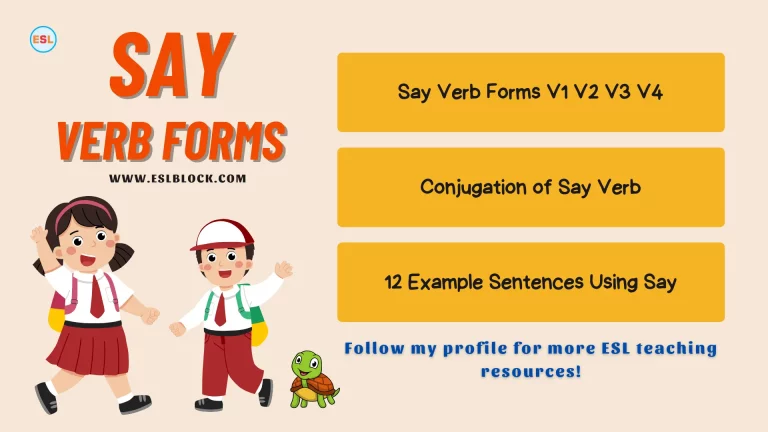
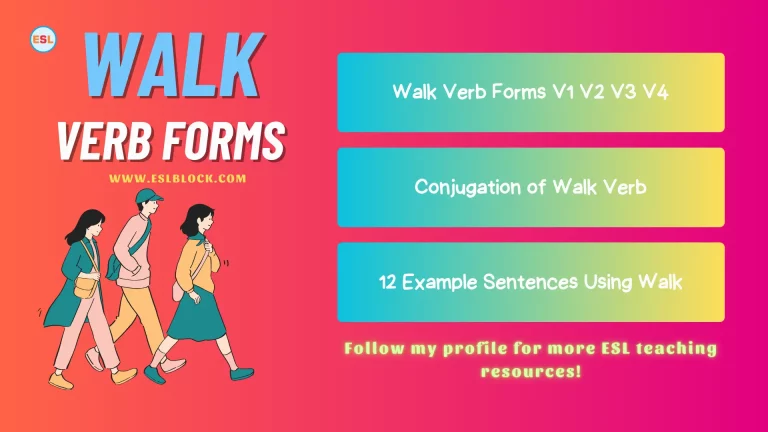
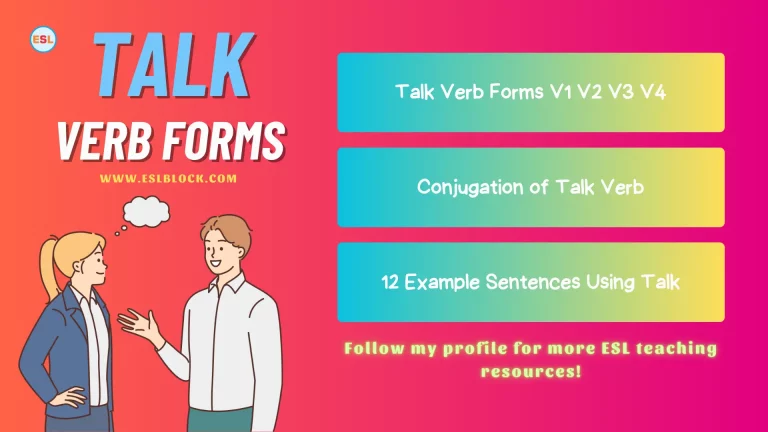
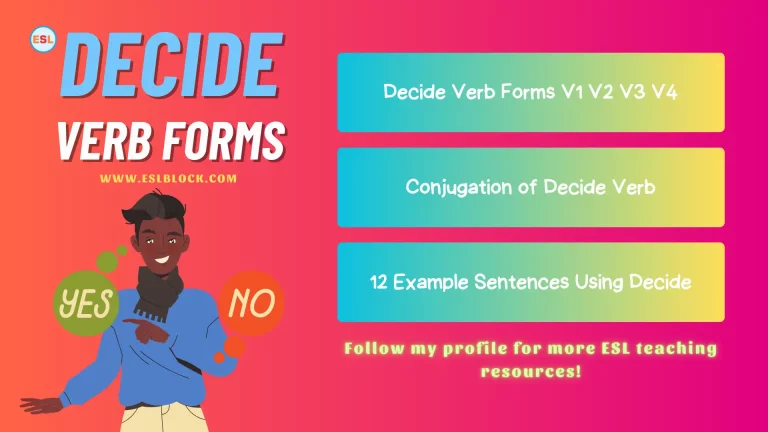
Very good article! We will be linking to this particularly great post on our website.
Keep up the good writing.
Thanks for ones marvelous posting! I actually enjoyed reading it, you may be a great
author. I will always bookmark your blog and will come back very soon. I want to encourage
you to definitely continue your great posts,
have a nice weekend!
Somebody necessarily assist to make significantly posts I might state. This is the very first time I frequented your website page and up to now? I amazed with the analysis you made to make this actual submit incredible. Fantastic activity!
You have observed very interesting details! ps decent web site. “The length of a film should be directly related to the endurance of the human bladder.” by Alfred Hitchcock.
I have read some excellent stuff here. Certainly value bookmarking for revisiting. I surprise how a lot effort you set to make one of these fantastic informative website.
An interesting discussion is worth comment. I think that you should write more on this topic, it might not be a taboo subject but generally people are not enough to speak on such topics. To the next. Cheers
Respect to post author, some fantastic entropy.
Attractive section of content. I just stumbled upon your blog and in accession capital to assert that I get actually enjoyed account your blog posts. Any way I will be subscribing to your augment and even I achievement you access consistently quickly.
I will immediately take hold of your rss feed as I can not to find your email subscription link or newsletter service. Do you have any? Please let me know in order that I may subscribe. Thanks.
This is such a brilliantly clear and organized guide to sentences! I’ve always struggled a bit with distinguishing between compound and complex, but your examples truly simplify it. This post makes a fundamental grammar topic feel totally approachable. Huge thanks for putting this together!